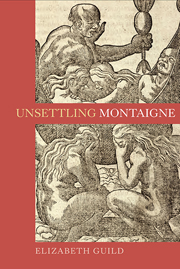Book contents
- Frontmatter
- Contents
- Acknowledgements
- Author's Note
- Abbreviations of Journal Titles
- Chronology
- Introduction
- 1 The Possibility of Their Being Otherwise
- 2 ‘Je ne vois le tout de rien’: The Cannibal and the Place of Knowledge
- 3 Cannibal, Beloved: On Eating What is Good …
- 4 Confessions: The Desire for Knowledge, the Passion for Ignorance
- 5 Tickling, Shaking, Shitting
- 6 The Place of the Brother
- 7 Uncertain Futures
- Bibliography
- Index
Introduction
Published online by Cambridge University Press: 05 April 2014
- Frontmatter
- Contents
- Acknowledgements
- Author's Note
- Abbreviations of Journal Titles
- Chronology
- Introduction
- 1 The Possibility of Their Being Otherwise
- 2 ‘Je ne vois le tout de rien’: The Cannibal and the Place of Knowledge
- 3 Cannibal, Beloved: On Eating What is Good …
- 4 Confessions: The Desire for Knowledge, the Passion for Ignorance
- 5 Tickling, Shaking, Shitting
- 6 The Place of the Brother
- 7 Uncertain Futures
- Bibliography
- Index
Summary
‘Je suis affamé de me faire connoistre … mais je crains mortellement d'estre pris en eschange par ceux à qui il arrive de connoistre mon nom’ (I am hunger-starved to make myself known … but I am mortally afraid of being mistaken by those who come to know my name). These words capture something of the complexity, demands and cost of Montaigne's desire to make himself known. The metaphor of appetite conveys the specific intensity of this desire; it simultaneously engages and unsettles the reader, signalling the kind of attention required by this communication. But desire rapidly gives way to fear: terrified recognition of desire's cost, given the vulnerability of words to misinterpretation and misappropriation; and already between these two clauses there is in fact a corrective: ‘ou pour dire mieux, je n'ay faim de rien’ (or, to put it better, I hunger for nothing). No hunger; no desire, only fear? Yet Montaigne goes on writing about himself. Perhaps this lack of hunger does not mean no desire; rather, a lack of lack: a surge of anxiety related to this urgent and consuming desire to make himself known without knowing what readers will make of him.
How are we to understand this acute instance of the revisions which are characteristic of his self-exploration? How to square Montaigne's mortal fear with his commitment to not having the last word, and how does the desire to communicate survive such fear? This sentence speaks of the interplay of personal and cultural anxieties at the time of writing, and invites us to wonder what kind of writing encourages readers towards open, unpossessive interpretations, and of what kind of culture might such interactions form part?
- Type
- Chapter
- Information
- Unsettling MontaignePoetics, Ethics and Affect in the Essais and Other Writings, pp. 1 - 10Publisher: Boydell & BrewerPrint publication year: 2014



